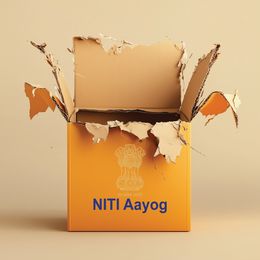Is the NITI Aayog an “institute” or a “commission”? With his childish penchant for converting Hindi words into English acronyms, Narendra Modi has expanded NITI—“sound advice”—to “National Institute for Transforming India”, and then added “Aayog”, Hindi for “commission”. So, NITI Aayog remains mystified over its role. The erstwhile Planning Commission had hard financial clout. The NITI Aayog’s role is at best “advisory”, moreover, the NITI Aayog’s attempt to position itself as the principal think-tank of the government has failed because there is endless overlap between “advice” tendered by NITI and the quite separate counsels, often on the same set of subjects, by the prime minister’s economic advisory council and the chief economic advisor sitting in the finance ministry (and oftentimes the Reserve Bank of India), not to mention the private think-tanks of saffron tendency such as the India Foundation and the Vivekananda Foundation, and earlier world-renowned independent think-tanks like the Centre for Policy Research that the saffron forces are attempting to sabotage and infiltrate. Worse, these various bodies outdo each other to act as echo chambers for what the prime minister wishes to hear—for if they did not, they would soon be out on their ear.
No wonder then that the West Bengal Chief Minister, Mamata Banerjee, has called for the “NITI Aayog to be scrapped” and demanded that the Planning Commission be brought back. Seven INDIA alliance-led state governments boycotted the NITI governing council session and three other chief ministers found it not worth their time to attend. Not one CM ever stayed away from consultative meetings with the Planning Commission because it was not just a talk shop but a hard bargaining counter where states, irrespective of the political colour of their governments, were afforded a bilateral forum to negotiate their way to a mutually acceptable conclusion on “rupees, annas and pies” to undertake the development and welfare activities entrusted to them by the Constitution.
Then, the Modi government invented the “double engine” to back states governed by the BJP to the detriment of the equitable formulae that the Planning Commission used to promote fair distribution without regard to political colouring. So, instead of “cooperative federalism”, we have “authoritarian federalism”, threatening the unity and integrity of India. The non-attendance by ten CMs of the NITI governing council is an early warning signal that to save our nation we must reverse gear.
The Constitution was written under the shadow of a possible Balkanisation of the country. To prevent that from happening, authority was loaded in favour of the Centre. So, instead of declaring India a federal Republic, we became a Union of states. One deleterious consequence of this, which has become apparent only after we got Central and state governments of different hues, is that while the seventh schedule clearly divides responsibilities between Centre and states such that much of grassroots economic and human development have been entrusted to states and panchayat raj institutions, the raising and distribution of financial resources is principally the Union’s responsibility. Therefore, the Constitution established an independent finance commission to determine the states’ share of divisible national resources, but as most remunerative taxes are reserved for the Centre, states stand with a begging bowl to get their due share, resulting in centrally sponsored schemes to bridge the gap between states’ duties and the funds required to discharge them. This aggravates central domination. That is the principal reason for our abject failure in attaining “inclusive growth”, that is, spreading the fruits of development to those most in need.
Modi aims at attaining Viksit Bharat 2047 through a clutch of oligopolists. That is the wrong way of making India prosperous—for it leaves ordinary Indians lagging behind. Gandhiji weeps.
Aiyar is a former Union minister and social commentator.


